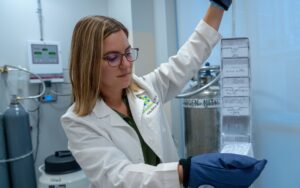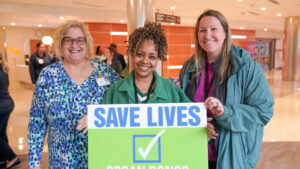EBrightHealth, an innovative, new partnership among five health systems in Delaware, is targeting antibiotic use in its first “Choosing Wisely” initiative to improve the quality of care for all state residents.
Studies show that more than 30 percent of all antibiotics prescribed in the United States are either unnecessary or inappropriate. Per capita, Delaware ranks in the second highest bracket for antibiotics prescribed, according to data presented by eBrightHealth.
“Overuse of antibiotics is an enormous issue in health care,” said Elissa Miller, M.D., chief of the Division of Palliative Medicine for Nemours/Alfred I. duPont Hospital for Children, an alliance partner. “It’s driven by a lot of different factors. That’s why this initiative is focused on consumer education as much as on educating physicians in order to try to change the culture.”
Joining Christiana Care and Nemours/A.I. duPont are Bayhealth Medical Center, Beebe Healthcare and Nanticoke Health Services.
In particular, the alliance is focusing on antibiotic stewardship in the treatment of viral upper respiratory infections in the outpatient setting and discontinuing the use of prophylactic antibiotics beyond 72 hours in hospitalized patients with no clear evidence of infection.

“Our antibiotics are becoming less effective because of the resistance being developed against them,” said Eric Gloss, D.O., vice president of Medical Affairs for Bayhealth Medical Center. “We already are seeing some infections that you can’t treat. This quick-fix society thinks antibiotics will improve their condition faster. The body has an amazing ability to heal itself. Sometimes, you just have to wait it out.”
Robert Dressler, M.D., MBA, quality and safety officer, Christiana Care iLEAD, and team leader for the Choosing Wisely workgroup, said the partnership has enormous potential to affect the lives of the more than 935,000 Delawareans affiliated with these five health systems.
“Just by having the conversation around these specific areas of antibiotic utilization and appropriateness, we’ll have a broader coattail and change areas we’re not currently focusing on,” he said.

Other states have forged similar partnerships, but they have grown from grassroots health care community efforts without initial health care system involvement. One of the unique characteristics of eBrightHealth is that it was created by the institutions with the ability to effect change, said Loretta Consiglio-Ward, MSN, RN, iLEAD and a quality and safety education specialist who is helping coordinate the eBrightHealth Choosing Wisely statewide network. “We’re the ones who influence the culture.”
Each team will tailor its approach to that health system’s resources and needs. For example, Nanticoke chose as its goal to reduce antibiotic prescriptions for probable viral respiratory infections by 10 percent over one year for Nanticoke network and emergency patients.
“Each institution is in a different place,” Dr. Dressler said. “We allow the teams the liberty and the flexibility to make it meaningful to them. The beauty of the way we’re doing this is that every team will be successful.”
Ken Silverstein, M.D., MBA, chief clinical officer for Christiana Care, pointed out the benefit on the flip side: Regardless of a system’s size, it can leverage the pooled resources stretching across the state.

“It would be prohibitively costly for Nanticoke, for example, to invest in certain systems of care. But their population is just as deserving – they shouldn’t be disadvantaged because they don’t have the size,” Dr. Silverstein said. “The power of this is that we’ve created scale across the entire state. We’re collaborating instead of competing.”
Participants from all of the health systems agreed that the sharing of ideas enabled by the initiative already counts as an accomplishment.
Robert Ferber, M.D., chief clinical innovation officer for Nanticoke Health Services, said he sees his counterparts from other hospitals on a monthly basis now and doesn’t hesitate to seek their advice.
“That would never have happened two years ago,” he said. “This increasing ease of working together has made a huge difference.”
Michael Salvatore, M.D., physician adviser for Beebe Medical Center, said an alliance such as eBrightHealth can achieve what a single institution cannot.
“This will create a critical mass — kind of a positive peer pressure,” Dr. Salvatore said.
Dr. Miller said she’s looking forward to sharing expertise. “One of the big hopes is that all of the different health systems are going to be learning from each other,” she said. “That’s the biggest goal for the next year, to set up this learning network so everyone else can replicate what’s been successful.”
Dr. Silverstein agreed.
“First and foremost, it’s about the sharing of knowledge and best practices to make sure populations in Delaware are getting the best care,” he said.



